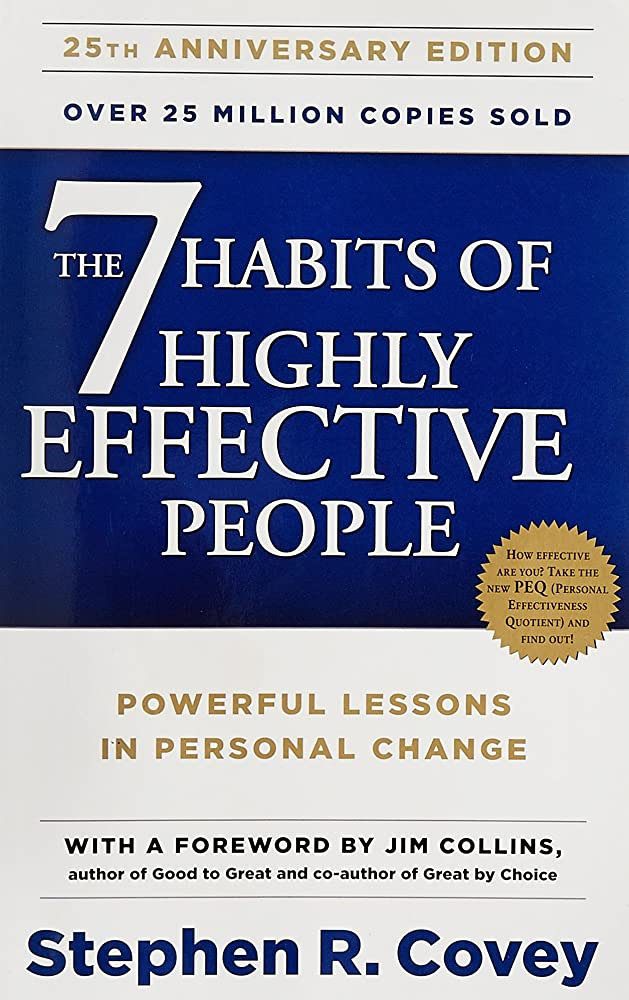It is a book written by Stephen Covey. It was published in 1989; the book has sold over 25 million copies worldwide and has become a classic in the field of personal development. The book presents a diverse come-up of personal and dedicated success, based on seven habits that Covey argues are essential for effective living.
The Paradigm Shift:
Covey argues that the first step to becoming highly effective is to make a paradigm shift. He emphasizes that effective living is not just about changing our behaviors or habits, but about changing our mindset. Covey encourages readers to shift from a mindset of dependence to one of independence, and ultimately to one of interdependence. He argues that this shift involves taking responsibility for our lives, developing a sense of purpose, and aligning our actions with our values.
The Seven Habits:
Covey presents seven habits that he believes are essential for effective living. These habits are:
Habit 1: Be Proactive: Covey argues that being proactive is about taking responsibility for our lives and making choices based on our values. He encourages readers to focus on what they can control, rather than being reactive to external circumstances.
Habit 2: Begin each day with a clear vision: Covey emphasizes the importance of having a clear sense of purpose and direction. He encourages readers to envision the outcome they desire, and then work backward to create a plan for achieving it.
Habit 3: Put First Things First: Covey argues that effective living involves prioritizing our time and energy. He encourages readers to focus on their most important goals and to schedule their time accordingly.
Habit 4: Think Win-Win: It means that it is important to look for such which are beneficial as well as satisfying. He encourages readers to adopt the mindset of so many and to look for ways to create win-win solutions.
Habit 5: Seek First to Understand, Then to Be Understood: Covey argues that effective communication involves listening to others with the intent to understand, rather than just to respond. He encourages readers to develop empathy and to seek to understand the perspectives of others.
Habit 6: Synergize: he emphasizes the power of teamwork and synergy. He encourages readers to look outside of the box and value different ideas and perspectives. In this way, you can get innovative solutions by working together
Habit 7: Sharpen the Saw: Covey argues that effective living involves taking care of ourselves physically, emotionally, mentally, and spiritually. He encourages readers to engage in activities that promote personal growth and renewal.
The Importance of Character:
Covey emphasizes the importance of character in achieving personal and professional success. He argues that our character determines our behavior and that we can develop our character through intentional effort. Covey encourages readers to focus on developing their character by embodying the principles of honesty, integrity, and respect for others.
The Power of Relationships:
Covey argues that our relationships are essential to our success and happiness. He emphasizes the importance of building trust, respect, and empathy in our interactions with others. Covey encourages readers to develop strong relationships by listening actively, valuing diversity, and seeking win-win solutions.
The Role of Leadership:
Covey argues that effective leadership involves empowering others to achieve their full potential. He emphasizes the importance of creating a shared vision, building trust, and developing a culture of collaboration. Covey encourages readers to adopt a leadership mindset by focusing on service, setting an example, and creating a legacy.
The Importance of Renewal:
Covey emphasizes the importance of renewal in achieving personal and professional success. He argues that renewal involves taking care of ourselves physically, emotionally, mentally, and spiritually. Covey encourages readers to engage in activities that promote self-care and personal growth, such as exercise, meditation, reading, and spending time with loved ones. He also emphasizes the importance of taking time to reflect on our values and goals, and to make adjustments as necessary.
Applying the Habits:
The author gives practical strategies for applying the seven habits in our daily lives. He encourages the audience to create personal growth, manage their time and energy, get feedback from other people, and improve them. Covey also emphasizes the importance of consistency and persistence in developing new habits and behaviors.
Criticisms and Controversies:
While this book has become a classic in the field of personal development, it has also been subject to criticism and controversy. Some critics argue that Covey's approach is overly individualistic and fails to address systemic issues, such as structural inequality and oppression. Others have criticized Covey's reliance on traditional values and his lack of attention to issues such as diversity, inclusion, and social justice.
Despite these criticisms, this book remains a widely-read and influential book in the self-help genre. Covey's emphasis on personal responsibility, integrity, and self-care continues to resonate with readers seeking to improve their lives and achieve greater success and happiness.
